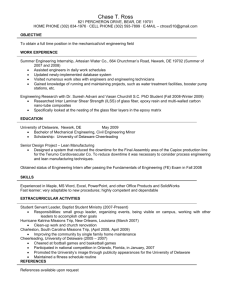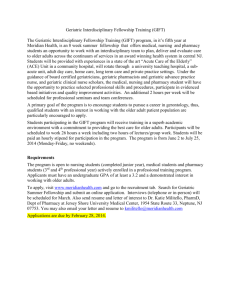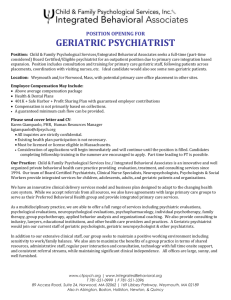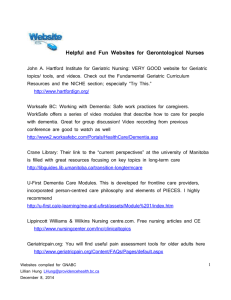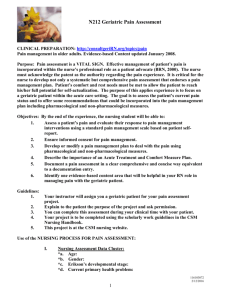Palliative Care in the Nursing Home Setting
advertisement
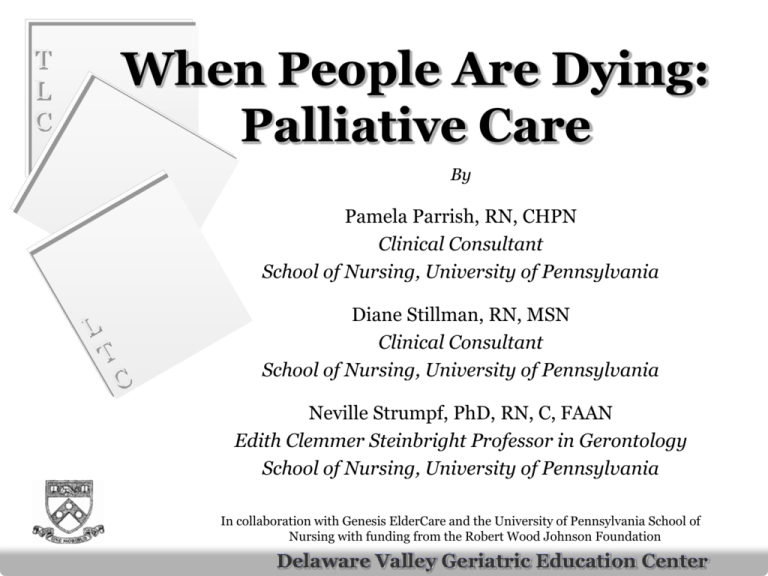
T L C When People Are Dying: Palliative Care By Pamela Parrish, RN, CHPN Clinical Consultant School of Nursing, University of Pennsylvania Diane Stillman, RN, MSN Clinical Consultant School of Nursing, University of Pennsylvania Neville Strumpf, PhD, RN, C, FAAN Edith Clemmer Steinbright Professor in Gerontology School of Nursing, University of Pennsylvania In collaboration with Genesis ElderCare and the University of Pennsylvania School of Nursing with funding from the Robert Wood Johnson Foundation Delaware Valley Geriatric Education Center T L C Objectives Direct care staff will be able to: Distinguish between palliative care and hospice Describe the domains of palliative care Describe the process of advance care planning Discuss approaches to relieving emotional and physical symptoms Discuss roles of various staff and services, including team functions, in social and emotional support 2 Delaware Valley Geriatric Education Center T L C Definitions of Palliative Care Study and management of persons with progressive, far advanced disease for which the prognosis is limited and the focus of care is on quality of life World Health Organization: Active, total care of persons whose disease is no longer responsive to curative treatment 3 Delaware Valley Geriatric Education Center Palliative Care T L C Distinctions from Hospice: Focuses on end-stages of chronic illness Targets people earlier in disease process Is not linked to reimbursement or prognosis Has greater flexibility to accommodate individual and family wishes Is complementary to hospice care 4 Delaware Valley Geriatric Education Center T L C Domains of Palliative Care Advance care planning Physical and emotional comfort Social, bereavement, and spiritual support 5 Delaware Valley Geriatric Education Center T L C Advance Care Planning Understand Values of the Person What makes life worth living Quality vs. prolongation of life Concerns over illness, suffering, control, alertness, family, death Religious or spiritual concerns Understand Legal Requirements Statutes and requirements vary by state 6 Delaware Valley Geriatric Education Center T L C Process of Advance Care Planning Step 1: Introduce the Topic Define ACP process and philosophy, determine comfort level with discussion, determine competence and desire to name an agent Step 2: Structure Discussions Discuss preferences and wishes and explore any inconsistencies Step 3: Document Preferences Document thoroughly and review frequently Update as needed 7 Delaware Valley Geriatric Education Center T L C Assessment & Management of Symptoms Physical symptoms may include pain, nausea/vomiting, diarrhea, constipation, itching, shortness of breath, lack of appetite, and others Attend to self reports and behavioral cues Manage symptoms Assess frequently and communicate with appropriate professionals Develop an ongoing plan of care focused on maximizing comfort 8 Delaware Valley Geriatric Education Center T L C Assessment & Management of Symptoms Emotional symptoms may include depression, anxiety, agitation, irritability, and others Assess frequently Communicate with primary care provider(s) and, if appropriate, psychiatrist, therapist, or clergy Develop an ongoing plan of care focused on minimizing patient and family distress 9 Delaware Valley Geriatric Education Center T L C Social, Bereavement, and Spiritual Support Meeting the needs of the dying person Offering hope Providing comfort Assuring community Maintaining meaning Sustaining dignity Limiting fears of abandonment 10 Delaware Valley Geriatric Education Center T L C Social & Spiritual Support Nursing Assist with hygiene, dignity, and privacy; maintain open communication with individual and family; encourage family involvement in care Social Services Coordinate family support; engage community services; assure wishes are congruent with advance directives and resolve any conflicts Dietary Arrange meals for family; provide comfort foods; liberalize diet; provide extra fluids for person 11 Delaware Valley Geriatric Education Center T L C Social & Spiritual Support Activities Offer pet therapy, reminiscence, aromatherapy, music therapy, gardening, and visits from children as desired PT/OT Assist in maintenance of independence and comfort; consult on positioning, safety issues, and pressure ulcer care Community Involve hospice, local clergy, and volunteers 12 Delaware Valley Geriatric Education Center Moment of Death T L C Develop approaches to ensure that death does not occur alone Maintain on call system-- family, staff, and volunteers to spend time with those actively dying Support family members at time of death Assume care of and show reverence for the body 13 Delaware Valley Geriatric Education Center T L C Bereavement Support for Survivors Sympathy cards Pamphlets on grief and loss, referral to community services Memorial services Bedside services Flowers and cards in reception area Angel tree, memorial garden, or other remembrance area Follow-up call or letter to family Delaware Valley Geriatric Education Center 14 T L C “I knew I could count on you to listen to my fears, and I often ran them by you…I always knew I could tell my wife anything, but I worried about her anguish over my suffering. You never stopped fighting for my comfort, and you never forgot that my pain was her pain. Thank you for that.” A husband writing to his late wife’s caregiver Delaware Valley Geriatric Education Center 15 T L C Objectives Review Can you now: Distinguish between palliative care and hospice? Describe the domains of palliative care? Describe the process of advance care planning? Discuss approaches to relieving emotional and physical symptoms? Discuss roles of various staff and services. Including team functions, in social and emotional support? 16 Delaware Valley Geriatric Education Center T L C Thank you for your attention! The End 17 Delaware Valley Geriatric Education Center


